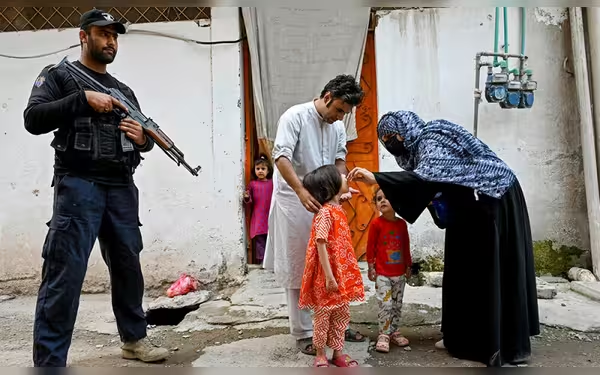Thursday, November 7, 2024 01:12 PM
Pakistan's Polio Eradication Efforts Face Militant Threats and Misinformation
- Polio cases in Pakistan rise to 45 in 2023.
- Health workers face life-threatening risks during vaccination.
- Religious leaders help dispel vaccine myths.
 Image Credits: brecorder
Image Credits: brecorderPakistan's polio eradication efforts are hindered by militant threats and misinformation, despite the dedication of health workers and community leaders.
PESHAWAR: The fight against polio in Pakistan is facing significant challenges, primarily due to militant attacks and widespread misinformation. Despite these hurdles, dedicated volunteer health workers remain committed to their mission of eradicating this debilitating disease. Polio, a virus that primarily affects children under five, can lead to lifelong paralysis. Unfortunately, Pakistan and Afghanistan are the only countries where polio remains endemic, and the number of cases in Pakistan is on the rise. This year alone, 45 cases have been reported, a stark increase from just six in 2022 and one in 2021.
The polio vaccine, which can be administered easily through a few drops, is a simple yet effective way to prevent the disease. However, in certain rural areas of Pakistan, health workers face life-threatening risks while trying to vaccinate children. Recently, a tragic incident occurred when a bomb targeted police officers who were escorting vaccination teams, resulting in the deaths of seven individuals, including five children. Just days before, two police escorts were killed by militants. Zainab Sultan, a 28-year-old health worker, expressed her sorrow, stating, "When we hear that a polio vaccination team has been attacked, it deeply saddens us. Our responsibility now is to continue our work. Our job is to protect people from disability, to vaccinate children, and to make them healthy members of society."
In the past, misinformation about the vaccine has fueled resistance among parents. Some falsely claimed that the vaccine contained pork or alcohol, making it unacceptable for Muslims. Additionally, a fake vaccination campaign organized by the CIA in 2011 to locate Osama bin Laden has further deepened mistrust. Recently, militant groups have shifted their focus to targeting police escorts, complicating the vaccination efforts. Since the Taliban's return to power in Afghanistan in 2021, Pakistan has seen a surge in attacks, with authorities claiming that hostile groups are now operating from across the border.
Ehsanullah, a local resident, shared his experience, saying, "In our area, nearly half of the parents were initially resistant to the polio vaccine, believing it to be a ploy by the West. There was a lack of awareness. If this disease is spreading because of our reluctance, we are not just harming ourselves but the entire community." Fortunately, some religious leaders, who hold significant influence in Pakistan, are now actively working to dispel myths about the vaccine. Imam Tayyab Qureshi stated, "All major religious schools and scholars in Pakistan have debunked the rumours surrounding the polio vaccine. Those who attack polio vaccination teams have no connection to Islam or humanity."
For some parents, endorsements from religious leaders have been crucial in changing their minds about the vaccine. Zulfiqar, a 40-year-old father, initially refused to vaccinate his children. However, after a conversation with the Imam of his mosque, who shared his own experience of vaccinating his children, Zulfiqar changed his stance. "Later, the Imam of our mosque came to explain the importance of the polio vaccine, telling me that he personally vaccinated his own children and encouraged me to do the same," he said.
Another challenge faced by health workers is the use of vaccination campaigns as leverage for community demands. Ayesha Raza, a spokeswoman for the government’s polio eradication campaign, noted, "There are demand-based boycotts and community boycotts that we face. Your demands may be very justified, but don’t link it to your children’s health." This highlights the complex interplay between health initiatives and local socio-economic issues.
For many health workers, the fight against polio is deeply personal. Ismail Shah, a polio survivor, is determined to make a difference. Despite having a paralysed leg, he tirelessly visits homes in Panam Dehri, advocating for the vaccine. "I decided in my childhood that when I grew up I would fight against the disease that disabled me," said the 35-year-old. Shah is one of 400,000 volunteers working to protect 45 million children from polio. Although he faced over 1,000 refusals in his area, he remains optimistic, stating, "Now, there are only 94 reluctant parents left, and soon I will persuade them as well."
The battle against polio in Pakistan is a testament to the resilience and dedication of health workers and community leaders. While challenges remain, the collective efforts to educate and protect children from this preventable disease continue to grow. It is crucial for communities to unite in this fight, recognizing that the health of their children is paramount. By overcoming misinformation and mistrust, Pakistan can move closer to eradicating polio once and for all.













